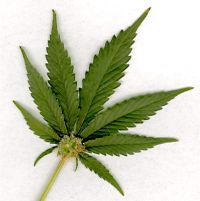Wired hipped us to a pair of new studies about the medicinal effects of marijuana. In the first study, published in the journal
Anesthesiology, 15 people had capsaicin ("the 'hot' chemical found in chilli peppers") injected right under their skin - which, remind me not to sign up for that study when it comes to town - and then dosed with either a "moderate" amount of pot or a large amount of pot. The results:
University of California researchers found moderate use had the greatest impact on pain in 15 volunteers, while large doses actually made pain worse....
Five minutes after smoking the drug, none of the doses had any effect on the pain felt.
But 45 minutes later, those who had smoked the moderate dose said their pain was much better, while those who consumed high doses said it had got worse.
They did, however, feel "higher" than counterparts who had taken moderate doses.
Of course, the real world implications of this study, while interesting, are hardly conclusive - except of course for those who advocate using pot to treat chili pepper burns. As Wired points out, "The University of California study needs to be conducted on a far larger group of subjects suffering from the sort of pain -- back pain, migraines -- that marijuana is used to treat in real life."
Meanwhile, a separate study, published in the
Journal of Neuroscience, examined the effects of pot on depression in rats, and found similar results as the U Cal study:
The neurobiological study conducted jointly by McGill University and a research institute affiliated with the Universite de Montreal indicates cannabis in low doses increased serotonin levels in the brains of laboratory rats.
The depletion of serotonin, a neurotransmitter that controls moods, leads to depression. Anti-depression drugs work by increasing the serotonin in the brain.
However, when the doses were increased on the rats, the effect was described as completely reversed, even devastating. Serotonin levels dropped significantly.
"We know from anecdotal evidence that (human) smokers of marijuana experience good effects ... but they also experience unwanted effects," said McGill PhD student Francis Bambico, who authored the study, which is to be published Wednesday in the Journal of Neuroscience.
"Some smokers experience anxiety, agitation. But at very high doses and in certain circumstances, it leads into depression-enhancing effects, particularly if you take in a lot of cannabis at very high doses."
This seems to be leading researchers down an interesting path: if low doses of synthetic THC compare to the SSRIs in terms of "enhancing the available concentration of serotonin in the brain," then one avenue worth looking at focuses on endo-cannabinoids, "natural substances in the brain that are released during high stress or pain, without the anti-depressive side-effects":
[Dr. Gabriella Gobbi] and her colleagues are focusing their research on a new class of drugs which enhance the effects of the brain's natural endo-cannabinoids.
"We know that it's entirely possible to produce drugs which will enhance endo-cannabinoids for the treatment of pain, depression and anxiety," she said.





















